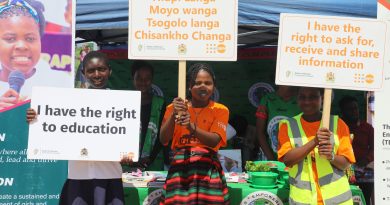SRHR and its benefits to the youth
By Joseph Kayira
In August this year, 18-year-old Martha (not real name) went to a local clinic in Blantyre to seek Sexual and Reproductive Health and Rights (SRHR) services. A friend told her that the clinic offered SRHR services and that many youths had benefitted in form of acquiring key information on critical topics such as safe and legal abortion, menstrual health, HIV and AIDS, comprehensive sexual education and services, child marriages and sexual identity.
So, when Martha stepped into the clinic asking for who was responsible for SRHR, the medical man she met scolded her for seeking such services when she was not even married. She was told in black and white that she “should concentrate on school and not waste time on things that will jeopardize her future.”
“The man took me aside and told me all sorts of things saying SRHR services are for those who are married or at least are through with their education. He said as a youth I should concentrate on my education. I did not understand him. One Non-Governmental Organisation that came to our school encouraged us to seek SRHR services because it is the youth who bear the consequences of early marriages, sexually transmitted infections (STIs) and unplanned pregnancies,” Martha says.
She says on that particular day she went home without getting the critical information she wanted on SRHR. Martha wanted to get information on how youths can protect themselves from STIs and unplanned pregnancies in view of peer pressure to date older men in search for money. She acknowledges that a lot of her peers at school have multiple boyfriends to make ends meet.
“Economic hardships are pushing a lot of girls to make bad decisions and engage in promiscuity. Life at college is demanding. There are so many things that girls need once in college; they are compelled to make bad decisions that push them into these unholy relationships. And this is where you need to have full information on SRHR,” she says.
Martha is of the view that youths must be equipped with information on safe sex, the dangers of dating multiple partners in the face of STIs and HIV and AIDS, and understanding the power of their sexuality. She explains that she has seen girls dropping out of school due to teen pregnancies “because they did not understand how their bodies work.”
She strongly thinks that gone are days when parents and guardians could not engage their children to discuss critical issues that surround SRHR including teen pregnancies and STIs.
“For instance, rarely do you see parents discussing with their children, issues to do with puberty. You only get information, which is largely wrong on puberty from your peers. I believe SRHR should begin at home. Clinics are also not helping much because most health personnel are not willing to share information on SRHR. If you insist, they will tell you to use condoms as form of protection. SRHR should go beyond condoms. Messages on SRHR should be informative and educative. That’s what the youth want,” Martha says.
Promote SRHR, remove financial barriers
Malawi is a signatory to many instruments on health. Most of these, including the United Nations (UN) Sustainable Development Goals, talk highly about “ensuring that all people have equitable access to needed health services (including prevention, promotion, treatment, rehabilitation and palliation) of sufficient quality to be effective, while also ensuring that the use of these services does not expose the user to financial hardship.”
The Southern Africa Development Community (SADC) Strategy for Sexual and Reproductive Health and Rights (2019-2030), says given the levels of economic inequality in the region, accelerating the response to SRHR needs to focus on making SRHR services accessible to all and removing any financial and other barriers that prevent access.
It says cognizant of the economic context and health system challenges of the region, Member States should find ways to address systemic challenges through the integration of services, using appropriate models that respond to their unique situation, and building strategic partnerships to address systemic issues.
The SADC SRHR Strategy says Member States should ensure that SRHR interventions: meet the age-specific needs of all people, in particular adolescent and young people; and remove the barriers to education and create economic opportunities to break the cycle of inter-generational poverty and reap the benefits of the demographic dividend.
It further says countries should meet the specific SRHR needs of men and boys, including the need for contraception, prevention and treatment of HIV and other STIS, sexual dysfunction, infertility and male cancers, and break unhealthy gendered patterns that impact on male health-seeking behaviours and facilitate a better understanding of the role that needs to be played by men and boys as partners.

Parents should be open to their children with messages of SRHR
“Member States should ensure that young people and adolescents are prepared, supported and provided with education and all the information and skills to make safe and healthy decisions about their life and future. This includes ensuring that adolescents and young people in-school and out-of-school have access to quality, comprehensive, age-appropriate, scientifically accurate life skills-based comprehensive sexuality education (CSE) with linkages to youth-friendly sexual and reproductive health (SRH) services and the youth sector more broadly.
“This will contribute towards addressing the disturbingly low levels of knowledge of HIV infection among adolescents and young people; reducing early and unintended pregnancies; eliminating GBV and child marriage and raising awareness and responding to the sexual exploitation of children and adolescents,” the SADC SRHR Strategy says.
The United Nations (UN) Sustainable Development Goals which were adopted in 2015, also emphasizes on ‘Good Health and Wellbeing’ in its Goal Number 3 of the 17 Goals, which are a series of call to actions to help progress the global community towards a more positive future. The youth therefore should form every part of health intervention, as only health population can take part in the implementation of SDGs. SRHR is a key component in building health nations, including Malawi.
From now on, SRHR issues should be encouraged and discussed at length in schools, colleges and universities. Cultural barriers that stand in the way of health debate on topics that form SRHR are the reasons youths have found themselves in situations that have perpetuated teen pregnancies, STIs, early marriages and increasing numbers of school drop outs.
Now is the time for youths to seek SRHR services. There is nothing to fear; it is not a crime to have access to information on anything – including SRHR topics. The constitution of Malawi grants that right. So, no parent, guardian, or medical personnel should stand in the way of youths who seek SRHR services.
“Knowledge is power. Most of the youth are entangled in their current misfortunes because they did not have knowledge in the first place. Talk of early pregnancies; talk of STIs and HIV and AIDS, and all the bad things that youths of today find themselves in. the source has been lack of knowledge,” Martha explains.
She adds that misconceptions and myths about SRHR issues are the reasons youths are pushed into believing dangerous narratives which have not helped matters. Martha says culture, knowledge and free access to SRHR services can perform wonders for youths of Malawi “who continue to be at risk of contracting STIs because everyone is too afraid to tell them life saving tips on sexuality and what goes around it.”
“The culture of concealing information, key information on SRHR must end now. Those responsible must open up and impart the knowledge we very much need to know. It can be the beginning of development. Every progressive nation treats SRHR issues with the utmost importance these issues deserve,” Martha says.



